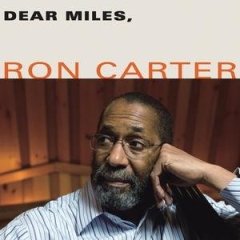Review by Brad Walseth
There really is no doubt that Ron Carter is the preeminent Jazz bassist of the last several decades. His legacy as member of one of Miles Davis' finest groups, his work as a sideman with most of the most notable Jazz artists of the era, and his output as a bandleader qualify him as a living legend. His playing, fulled-tone, brawny and exceedingly intelligent, ranks at the highest level with perhaps only Charles Mingus and Ray Brown as true peers in sound, taste and originality.
After years of relative silence regarding his years with Davis, Carter has released an extraordinary tribute to his singular former bandleader, Davis. Entitled, "Dear Miles," the bassist approaches the trumpeter's work with an unusual quartet setting: piano, bass, drums and percussion. This arrangement allows Carter to produce versions of such classics as "Gone," "My Funny Valentine" and "Stella by Starlight" that breath new life into the late trumpeter's well-worn songbook.
By not having a horn in the recording, the attention is demanded by the rhythm section (piano included of course). Stephen Scott's impressive piano work touches on Bill Evans (and Monk!) and leaps ahead, while drummer Payton Crossley is sensitive yet muscular when needed. Roger Squitero adds some tasty percussion sounds that flavor the songs like a chef adding seasoning. Meanwhile Carter's bass is sublime, centering the session with his glorious tone and impeccable note choices. Not that the bassist doesn't take chances either, his lines pleasantly surprise with their unusual directions.
These first-take songs were recorded in one morning session and there is a remarkable vitality to the music that is often lacking in overproduced modern music. Old favorites like "Bye Bye Blackbird," "Bag's Groove" and "Someday My Prince Will Come" are joined by exceptional Carter originals "Cut and Paste" and "595" which both fit right in with the format. The chestnut "As Time Goes By" is also included as a tribute to Miles' ability to make popular music his own (like "Bye Bye" and "Time After Time"). This album has received considerable acclaim and deservedly so as it offers a wonderful opportunity to hear the Jazz world's true bass master in his prime, as well as experiencing refreshing alternative arrangements of the Miles canon.
|

